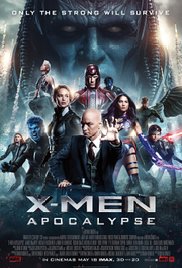STOP. Before continuing, click here for important Internet security information about browsing this site.
If a web address is not clickable, copy and paste it into the address bar of a new tab.
Try to switch to using https://github.com/pinotes/pinotes.github.io if you find yourself visiting this site regularly.
Culture/Reviews > Movies
Movie reviews from Proletarian Internationalist Notes—news, reviews and analysis from a global perspective
Real revolution looks like the end of the world to Amerikans: “X-Men: Apocalypse”

“X-Men: Apocalypse”
Dir. Bryan Singer
Starring James McAvoy, Michael Fassbender, Jennifer Lawrence, Oscar Isaac, others
20th Century Fox
PG-13, 144 minutes, 2016
Spoiler alert
A force emerges from the Third World, eliminates everyone’s nuclear weapons, starts leveling the world’s uneven infrastructure, and threatens “systems.”
What’s not to like?
Unfortunately, the force is Apocalypse (En Sabah Nur, played by Oscar Isaac), the ultra-bad guy in this “X-Men” movie.
En Sabah Nur enlists the help of a bereaved Magneto and a few other mutants. Two – Arabic-speaking multilingual Storm, played by Alexandra Shipp, and Psylocke, played by Olivia Munn – appear to be of non-European descent. (Psylocke is from England in the comic books, but was perceived as having an Asian appearance before “X-Men: Apocalypse.” Storm is from Egypt in the comic books. En Sabah Nur was born in Egypt in the comic books, and eir name means “the morning light.”) They battle mutants centered around Professor X, who works with CIA agent Dr. Moira MacTaggert who has an office in Langley.
Previous “X-Men” movies have suggested a need to understand supervillains – as well as heroes – psychologically. “X-Men: Apocalypse” has one of the most sympathetic portrayals of Magneto, including flashbacks from childhood reused from previous movies. That together with En Sabah Nur’s getting rid of nuclear weapons, “X-Men: Apocalypse” seems to be trying to say something complex about Amerika’s enemies.
This writer always preferred Magneto. Professor X is an integrationist, patriotic or reformist symbol so it’s natural to favor some of the villains in these movies and want them to win regardless of their drawbacks. One could think of the drawbacks as the lies Amerikans tell about their enemies. Since Magneto ends up fighting En Sabah Nur, though, En Sabah Nur is the best candidate for being a symbol of revolution or resistance in “X-Men: Apocalypse.” Alternatively, Magneto represents the idea of uniting with others for a certain, revolutionary purpose before parting ways. Various individuals in “X-Men: Apocalypse” should be thought of as representing classes or groups of nations in the world, not just some individuals.
En Sabah Nur arises from Egypt and claims to be the one true god who has returned to rid the world of idols and save it. The force that gets rid of the world’s nuclear weapons thus has a religious appearance. Because En Sabah Nur has a body and seemingly can be killed, Jews and Muslims would say there is something polytheistic about En Sabah Nur, but many viewers will think of Islam because of the setting. En Sabah Nur’s attempt to flatten the world’s infrastructure and eliminate systems will remind viewers of terrorism more than it causes thinking about how geographic differences and systems cause oppression. Besides needing to be special snowflakes, Amerikans think their wealth and ten-times-higher-wages are a result of so-superior Amerikan productivity. And to Amerikan reactionaries calling themselves “socialist” and “atheist” while worshiping Amerikan exploiters and Amerikan institutions, any movement of predominantly poor Muslims must be less worthy or proletarian in character than any Amerikan movement with secular and progressive rhetoric.
Anyway, the CIA goes to Egypt to get some intel, and then the X-Men go in as if they were some kind of military special ops. The u.$. military is shown as wanting to know what happened to the nuclear weapons and wanting to use mutants as weapons. Various countries including the Soviet Union (which was an imperialist country by the year the movie is set in and no longer exists) are accurately portrayed as having nuclear weapons, but the point of view during much of the movie is Amerikan.
The main objection to En Sabah Nur seems to be that ey wants to control everyone. Some would say humyns should have nuclear weapons so they can have the choice to use them or not. Likewise, some justify inequality as giving the rich an opportunity to be charitable etc. Many in the world’s oppressor nations have a notion of needing choice for its own sake and aren’t so concerned about the details of concrete choice, the consequences and dangers of certain choices – except of course when they need to repress people in oppressed nations or put people in prison. There are plenty of ways to demonstrate morality, though. The ability to lay waste to the planet in a matter of minutes is supposedly something everyone can agree the world can do without.
The way it happens is the stuff of superhero fiction, but it would be good to be rid of the things En Sabah Nur wants to get rid of, including the systems that cause people to rebuild arsenals and the uneven infrastructure that is a cause of international exploitation and global inequality. The psychologizing of the villains distracts from this. Magneto’s pain and trauma don’t make anything ey does right or wrong. Nor does any motivation such as revenge.
That said, “X-Men: Apocalypse” raises the idea that many would regard as a threat a solution for eliminating all nuclear weapons. Amerikans don’t take the threat posed by nuclear weapons seriously enough to want to overthrow u.$. imperialism if that is a necessary step, the movie seems to say. Amerikan viewers should consider where they stand and what their thoughts are related to this. For example, do they feel Amerika has an innate purity of motivation that makes Amerika’s superior arsenal worth keeping and utilizing to intimidate the rest of the world. ◊
_____________________________________
home | latest | campaigns | movie reviews | newsletter
